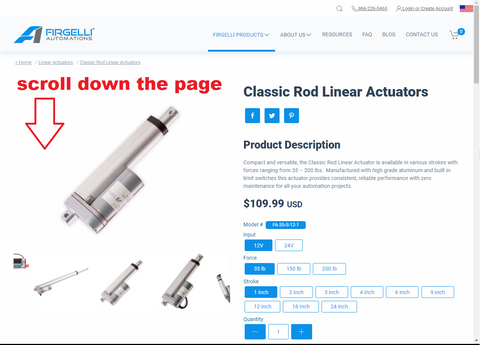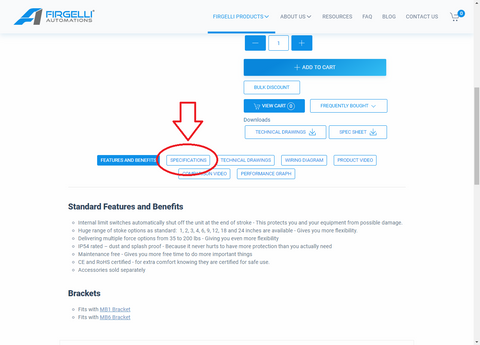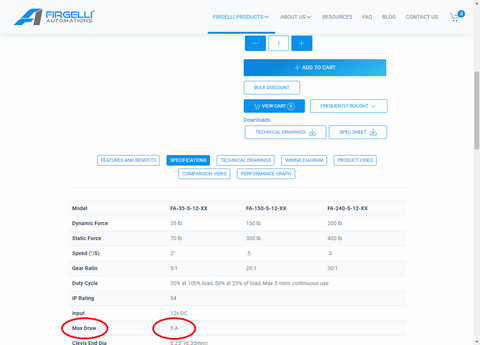To ensure you are able to get the most out of your linear actuator(s) it is vital you choose an appropriate power supply. We offer several different power supplies; this tutorial is aimed at assisting you in selecting the one that best fits your needs.
Power supply options
- 12V battery or 12V car battery
- 12V 5A AC to DC wall converter
- 12V 30A AC to DC power supply
- Water resistant 12V 30A AC to DC power supply
Understanding voltage requirements
Most of our linear actuators are 12V units with the exception of a few 24V options. All the power supplies we offer are only rated for 12V, as such if using a 24V actuator you will need to source your own 24V power supply. Assuming you are using 12V, continue to the next step to narrow down the four options above based on the current required.
Understanding current requirements
To identify the required current of your power supply you first need to know the max current draw of your actuator(s). As shown in the pictures below, go to your products' page, scroll down, click the "specifications" tab, record the "max current rating" value. In the pictures below I am using the classic linear actuator and the "max current draw" is 5 amps:
Now multiply the max current draw by the number of actuators for are using to know your required current, for example if I was to use three classic actuators I would require a 12V power supply with a minimum current rating of 15A (3*5A = 15A). Thus, in such situations we recommend using AC to DC Power Supply 12V 30A or Water Resistant LED Power Supply 12V 30A both safe for driving up to six 12V 5A linear actuators.
If you are just driving a single 12V actuator we recommend using the 12 Volt DC Battery or the DC Power Adapter 12V as it is an easy and direct connection.
12V battery or car battery
A 12V battery is a good option for desktop prototyping or portable applications. However with the exception of costumes most applications for linear actuators remain in the same spot (i.e. opening a trapdoor or hatch). Due to the stationary nature of most projects we generally advise against a battery as it must be periodically recharged. If you are using linear actuators in your vehicle then you can certainly use the 12V car battery.
12V 5A AC to DC wall converter
The 12V 5A AC to DC wall converter an easy "plug and play" power supply. Simply connect it directly to the wall outlet and it will supply 12V at a maximum current of 5A. Given the current limitation it is generally only suitable for powering one linear actuator.
12V 30A AC to DC power supply
The 12V 30A AC to DC power supply is great for supplying a high current, however be warned, as this is a user adjustable power supply it is inherently dangerous and has the ability to serious injure of kill. Do not allow children to use and when installed and powered on, ensure it is out of reach of children, pets, and unaware adults. Even when disconnected the internal capacitors hold charge and can cause bodily damage, never open the unit.
To use this product first select the correct input voltage (on the side of the case there is a switch that can be set to either 110V or 240V). Then using a power cable, with the wires exposed, make the connections below.

The "+V" pins will output 12V and the "-V" will be at GND (or 0V). This power supply can given up to 30 amps which is enough for up to 6 premium or classic linear actuators. Note that you should never change the wiring while the power supply is connected and the exposed screw terminals present a serious risk to anyone being careless with this power supply.
Water resistant 12V 30A AC to DC power supply
The water resistant 12V 30A AC to DC power supply has the same specs as the above product, however being a fully sealed case it is both water resistant and a little safer (although not entirely risk free). Connect a power cable to the 3 exposed wires (GND, Neutral and Live) and insulate with heat shrink tube (ensure that your insulation is rated for well over 110V). On the other side there are a two pairs of 12V output.


